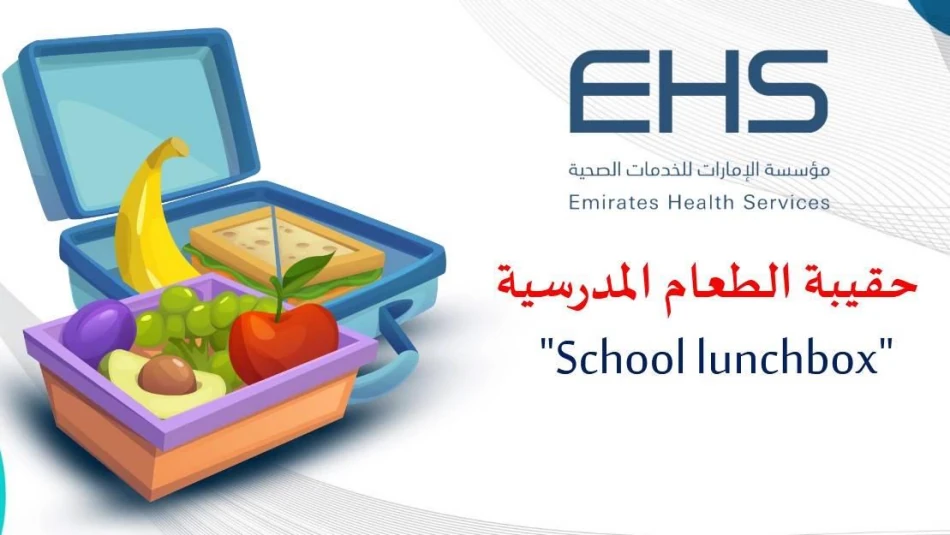
Fuel Your Student's Day: Nutritious Lunchbox Recommendations for Academic Success
UAE Schools Launch Comprehensive Food Revolution to Combat Child Obesity Crisis
The UAE Emirates Health Services Authority has unveiled six fundamental guidelines for school lunch boxes, marking the country's most ambitious effort yet to reshape childhood nutrition habits. The initiative, which bans 15 categories of popular foods while promoting 85 approved alternatives, signals a decisive shift toward preventive healthcare in schools—potentially serving as a model for Gulf nations grappling with rising obesity rates among children.
The Science Behind the Six-Point Framework
The new guidelines prioritize fiber-rich carbohydrates as the primary energy source, alongside mandatory vegetables or salads, protein sources from both animal and plant origins, and daily fruit portions. The emphasis on dietary variety aims to prevent nutritional monotony while ensuring students receive comprehensive essential nutrients throughout the school week.
This approach aligns with mounting research linking balanced school nutrition to improved academic performance and concentration levels. The UAE's focus on plant-based proteins like lentils and beans alongside traditional meat sources reflects growing global awareness of sustainable nutrition practices.
The Banned Food List: A Public Health Statement
High-Risk Items Eliminated
The authority's prohibition list reads like a catalog of modern childhood dietary concerns. Eggs face exclusion due to rapid spoilage risks in school environments, while processed meats like mortadella are banned for excessive fat and sodium content. Energy drinks and sodas—significant contributors to childhood caffeine dependency—join donuts, chocolate, chips, and manufactured sweets on the forbidden list.
Beyond Nutrition: Practical Considerations
The guidelines extend beyond nutritional value to address classroom dynamics. Strong-flavored foods like onions and garlic are restricted, while allergen-heavy items including nut-containing chocolates, cream-filled cakes, and chewing gum face elimination. This comprehensive approach suggests UAE authorities recognize that school food policies must balance health, safety, and learning environment considerations.
Market Response: 85 Approved Products Transform School Canteens
The Ministry of Education's approved vendor list for the 2025-2026 academic year represents a significant market opportunity. Eighty-five approved food categories spanning sandwiches, fresh produce, dairy products, and 100% natural juices will be supplied by prominent national companies including Al Ain Farms, Almarai, Al Rawabi, Al Marmoom, and Hayatna.
This partnership model demonstrates how public health initiatives can simultaneously support domestic food industries while ensuring quality control. The involvement of established UAE brands suggests confidence in local production capabilities and may encourage further investment in healthy food manufacturing.
Regional Leadership in Child Wellness
The UAE's comprehensive approach positions it ahead of regional competitors in addressing childhood nutrition. While countries like Saudi Arabia and Qatar have implemented similar initiatives, the UAE's integration of specific portion controls for different grade levels and partnership with national food producers creates a more systematic framework.
The timing proves strategic, as Gulf nations face increasing pressure to address lifestyle-related health issues among younger populations. Early intervention through school nutrition programs offers long-term healthcare cost savings and productivity benefits that justify initial implementation investments.
Implementation Challenges and Long-Term Impact
Success will depend heavily on enforcement consistency across the UAE's diverse educational landscape and parental compliance with home-packed lunch guidelines. The initiative's emphasis on raising nutritional awareness among students and parents suggests authorities understand that lasting change requires cultural shifts beyond regulatory compliance.
If successful, this comprehensive food policy could establish the UAE as a regional hub for childhood nutrition expertise, potentially attracting international partnerships and research opportunities. The program's focus on establishing permanent healthy patterns while reducing processed food consumption represents a significant public health investment with implications extending well beyond school years.
Most Viewed News

 Omar Rahman
Omar Rahman






